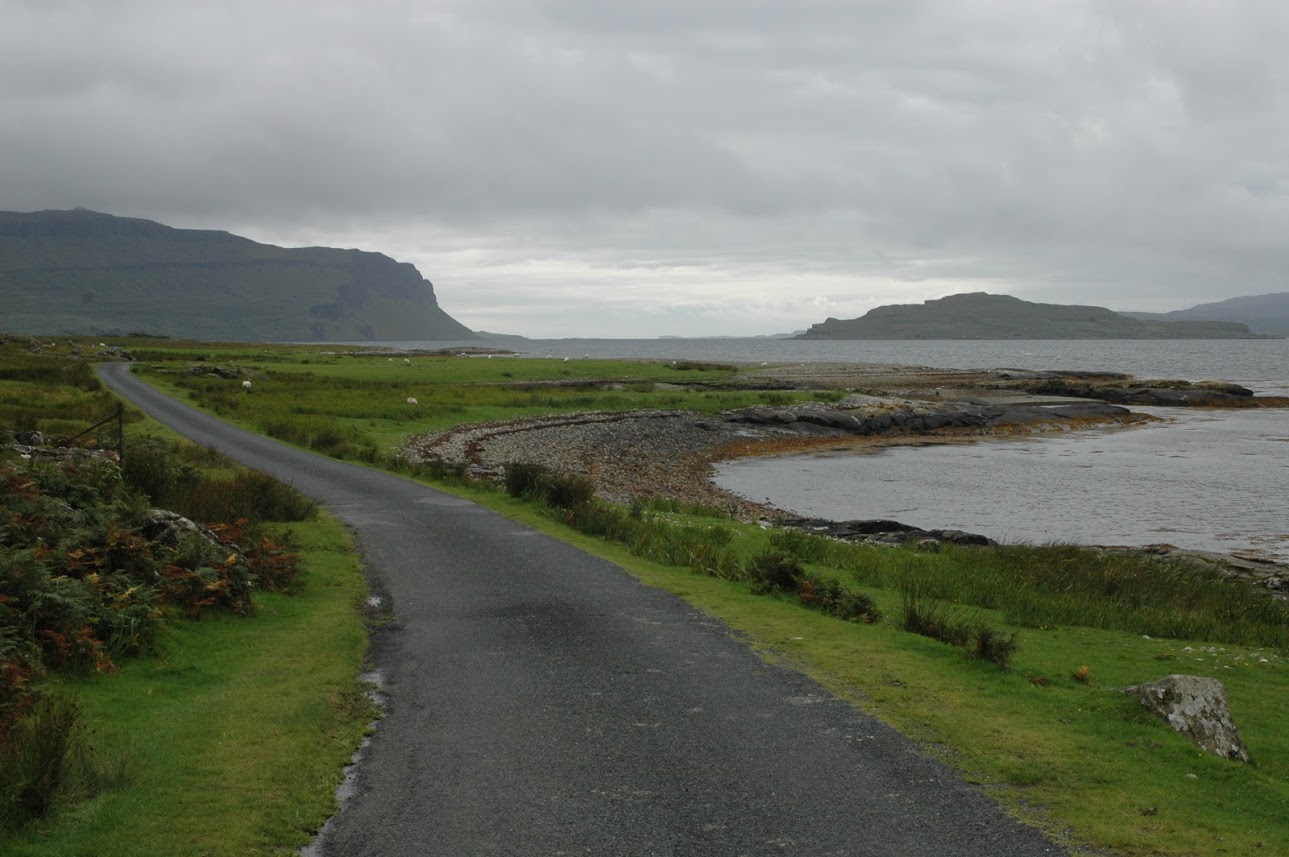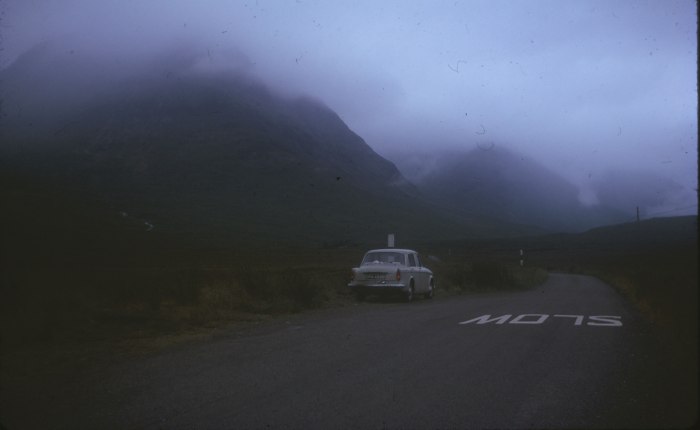Are there any wild places left in our over-populated islands? Robert Macfarlane’s book ‘Wild Places’ shows that there are indeed. In fact they’re everywhere.
Wild Places
What is it that makes wild places so special? Is it their grandeur, remoteness and isolation, like my photo (above) of the Glen Coe area? Or is it the sense of awe and mystery that they stir in us, taking us out of our ‘comfort zones’?
The island of Skellig Michael, nine miles off the coast of South West Ireland, is such a place. In 1910 after a very scary two hour rowing boat ride there, then returning in the mist and darkness, George Bernard Shaw wrote to a friend:
“I tell you the thing does not belong to the world that you or I have lived and worked in: it is part of our dream world…..I hardly feel real again yet!”
Such places do us much good when we visit. We return to ‘normal’ life all the better for the experience, having been humbled in the presence of these magnificent ageless spaces. As R.S.Thomas noted:
“When you see your own shadow passing over rocks millions of years old it makes you think.”

However, sadly, such wonderful places are under serious threat here, as they are elsewhere.
“Something will have gone out of us as a people if we ever let the remaining wilderness be destroyed … We simply need that wild country available to us, even if we never do more than drive to its edge and look in.”
― Wallace Stegner, writing in America in 1960.
‘The Wild Places’ by Robert Macfarlane
I’ve recently been reading this widely acclaimed book which tells of Robert’s search for some of the last remaining wild places in these islands. Beginning in Scotland he climbs Ben Hope and visits Cape Wrath in the far north, Rannoch Moor and the Black Cuillin of Skye. Spending nights sleeping wild he experiences something of the atmosphere of each place, as in the deserted glens still marked by their sad memories of the brutal ‘Clearances’ in the early 19th century.

He explores Lock Coruisk, set in the great amphitheatre of the forbidding Cuillin mountains, relics of an old volcano from 60 million years ago. He then climbs the heights to the imposing ‘Inaccessible Pinnacle’. It brings back memories of my standing on the summit of Bruach na frithe looking out over the whole of these black, austere and brooding mountains, the home of eagles, ravens and a sense of timeless stillness. It was an awesome moment that has stayed in my memory ever since. Sadly, I didn’t have a camera then, but to get the wild ‘elemental’ feel of the place look at these photos.
After visiting the atmospheric Burren, at the mid western edge of Ireland, with its rich history and its famous limestone pavements criss-crossed by ‘grykes’, Robert Macfarlane returns southwards. As he does so he readjusts his view of wildness finding that it’s everywhere, and always influenced by the human history of the place. He explores the magic of Orford Ness, the ‘Holloways’ of Dorset, The Essex coastal marshes and more.

The Wind in the Wilderness
Back in his Cambridge beech woods from where his journeys began, Robert re-discovers his own local ‘wild place’. Hearing the sound of the wind in the trees he begins thinking through all the wild places he has visited:
“I imagined the wind moving through all these places and many more like them: places that were separated from one another by roads and housing, fences and shopping centres, street lights and cities, but were joined across space at that time by the wildness in the wind. We are fallen in mostly broken pieces, I thought, but the wild can still return us to ourselves.”
I do hope so too.
If we listen, we too can hear the call of the wild places and respond. One reviewer said “the greatest praise I can give the book is to reveal that I have bought a pair of walking boots.” Perhaps we should all buy a pair ourselves!
A wonderfully rich world waits our exploration. Long live our wild places!
Thank you for journeying with me.
How well do you know your favourite ‘wild places’?

I agree, there are wonderful, wild places left to explore. I always loved to walk up onto Anglezarke Moor, Lancashire and experience the raw, emptiness of the place.
LikeLiked by 2 people
‘Raw emptiness’ in an overcrowded island is a precious rare thing. Yet outside the cities, climb almost any hill and the ‘greenness of the view often surprises, with few buildings in sight. Wildness is closer than we think.
LikeLike
I really don’t know the answer what makes wild places so charming, Richard. Your post is simply astonishing. All we’re left is to enjoy wild places and their magic!
LikeLiked by 1 person
Thanks for your comment. I’m glad you too, enjoy wild places. If we knew the answers of course, these places would lose their magic. There are inexhaustible treasures out there waiting!
LikeLike
I love Robert Macfarlane’s writing! He seems to be able to tap into our deep instinctive feelings and to bring us close to not only the wild places around us, but also to the souls of other people through the ages who have felt drawn to these special places too.
I do feel peeved sometimes when reading his books to see how easy it is for him to go off and explore the world, looking for old ways, wild places, landmarks and mountains! He instills the yearning in me to escape! Fortunately, I don’t need to go far to discover windswept and bleak but beautiful locations!
Thank-you for this thoughtful post, Richard and your review of his book.
LikeLiked by 1 person
I fully understand how you feel the frustration, Clare. I do too, at times. But like you, I’m able to ‘travel’ through memories, and through books and online. It’s great to revisit that view of the Black Cuillin in this way. Then there are all those local wild places awaiting our fuller exploration. Of course, it can’t have been easy for Robert’s long-suffering wife!
LikeLiked by 1 person
Thank-you, Richard. I wrote a piece for our church magazine about a year ago in which I said how much I enjoy reading natural history and travel books and how the families of these writers must have been very tolerant and long-suffering!
LikeLiked by 1 person
That’s a lovely post, Richard. I tried one of Robert Macfarlane’s books sometime back, but got bored with his style; I should have another go. There is certainly something about wild places. Though I doubt we have anything truly wild and untamed in the UK (though would town centres at night qualify?!), the few I have experienced are scary enough. The power of nature can be both calming and terrifying; humbling and uplifting.
LikeLiked by 1 person
Thanks Mike. I like the poetic way Robert M. plays with words and language, though I can see it’s not to everyone’s taste. Although there may be more wild places elsewhere, I find the stark wildness of parts of Scotland such as the Black Cuillin of Skye wild enough. Seeing a fierce Atlantic storm crashing against our coasts seems pretty ‘untamed’ to me! Our people could do with a lot more contact with the awesome and humbling power of wildness – our late night revellers especially!.
LikeLiked by 1 person
I enjoyed reading McFarlane’s Wild Places and I do think it’s interesting to think about where our ‘wild places’ are. As Clare said, we can’t all go off and sleep under the stars in the wilderness, so we may have to find these places closer to home! I suspect there are very few real ‘wild’ places left, since humans have shaped the landscape over so many years, but even in towns and cities there are places that feel wild – and there is always the sea. I love the way you build a piece of writing Richard, with your thoughts, quotes and pictures and this was no exception.
LikeLike
Thank you again for an encouraging comment Andrea. I agree with you and Clare that for most of us our local ‘sense of place’ is what matters, rather than those far away places. To be fair, I think this was what Robert M. was suggesting at the end of his book. After all, John Constable rarely moved from the Dedham area yet he has left his mark worldwide. There’s more than enough in our home place awaiting our discovery – and yes, ‘there is always the sea.’
LikeLiked by 1 person
Richard,I feel out of step with you all this time. I think I fear “the wild”, the lonely, the features that make a place wild. Perhaps this is a lack in me, I crave intimacy, beauty, the music of water, colour, tranquility. My son would identify with you and I wish I could. But I guess I am timid, lacking depth
LikeLike
Thank you June. Maybe such places are not for you. I share your preference for the quiet and the beautiful. But I have also learned much from seeing God’s grandeur in Creation in the wild places as I did in the Black Cuillin of Skye.
LikeLike